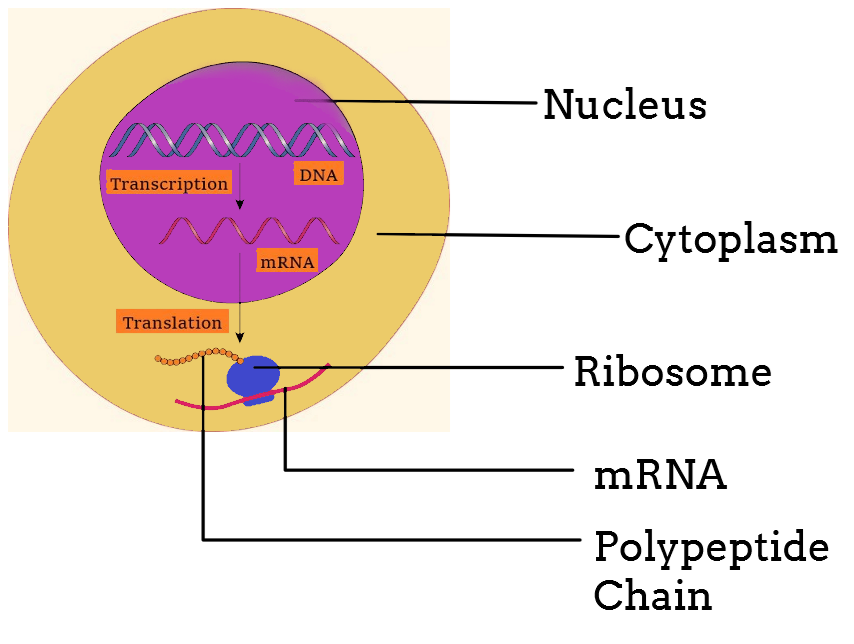
Where are proteins synthesized in the cell?
Answer
564.9k+ views
Hint: Proteins are the building blocks of life and are necessary for various processes and act as enzymes, hormones, etc. These are synthesized in a granule-like structure present in both eukaryotes and prokaryotes.
Complete answer:
Proteins are synthesized in the ribosomes, which are made up of two units, one large unit, and one small unit. In eukaryotic cells, these are attached to the Endoplasmic Reticulum.
Additional Information:
-Proteins are large biomolecules that perform a lot of important functions in an organism. They are the building blocks of our bodies.
-Proteins are made up of a combination of amino acids,
-The information to produce a protein is encoded in the cell’s DNA. The information is then transferred outside the nucleus to the ribosome by a large molecule called mRNA.
-Ribosomes, read the information in the mRNA and use to assemble amino acids into a protein, using tRNA,
-tRNA brings the proper amino acids to the ribosome. Ribosomes can be free-floating in the cytoplasm or attached to the endoplasmic reticulum, in which case it is called the rough endoplasmic reticulum (RER).
- This whole process of synthesis is called ‘translation.’
-Modification of protein takes place in the Golgi apparatus.
-Transcription (formation of mRNA from DNA) occurs in the nucleus of the cell.
- Manufactured proteins can be secreted outside the cell (hormone) or can be used inside the cell (enzymes).
Note:
-Both ribosomes are attached to ER and free Ribosomes in cytoplasm manufacture proteins.
-Ribosomes are made up of rRNA.
-Ribosomes are formed of two subunits.
In eukaryotes -
a) Cytoplasm: 80s Ribosome = 60s + 40s
b) Mitochondria: 70s Ribosome = 50s + 30s
In prokaryotes- Cytoplasm: 70s Ribosomes = 50s + 30s

Complete answer:
Proteins are synthesized in the ribosomes, which are made up of two units, one large unit, and one small unit. In eukaryotic cells, these are attached to the Endoplasmic Reticulum.
Additional Information:
-Proteins are large biomolecules that perform a lot of important functions in an organism. They are the building blocks of our bodies.
-Proteins are made up of a combination of amino acids,
-The information to produce a protein is encoded in the cell’s DNA. The information is then transferred outside the nucleus to the ribosome by a large molecule called mRNA.
-Ribosomes, read the information in the mRNA and use to assemble amino acids into a protein, using tRNA,
-tRNA brings the proper amino acids to the ribosome. Ribosomes can be free-floating in the cytoplasm or attached to the endoplasmic reticulum, in which case it is called the rough endoplasmic reticulum (RER).
- This whole process of synthesis is called ‘translation.’
-Modification of protein takes place in the Golgi apparatus.
-Transcription (formation of mRNA from DNA) occurs in the nucleus of the cell.
- Manufactured proteins can be secreted outside the cell (hormone) or can be used inside the cell (enzymes).
Note:
-Both ribosomes are attached to ER and free Ribosomes in cytoplasm manufacture proteins.
-Ribosomes are made up of rRNA.
-Ribosomes are formed of two subunits.
In eukaryotes -
a) Cytoplasm: 80s Ribosome = 60s + 40s
b) Mitochondria: 70s Ribosome = 50s + 30s
In prokaryotes- Cytoplasm: 70s Ribosomes = 50s + 30s

Recently Updated Pages
Master Class 11 Computer Science: Engaging Questions & Answers for Success

Master Class 11 Business Studies: Engaging Questions & Answers for Success

Master Class 11 Economics: Engaging Questions & Answers for Success

Master Class 11 English: Engaging Questions & Answers for Success

Master Class 11 Maths: Engaging Questions & Answers for Success

Master Class 11 Biology: Engaging Questions & Answers for Success

Trending doubts
One Metric ton is equal to kg A 10000 B 1000 C 100 class 11 physics CBSE

There are 720 permutations of the digits 1 2 3 4 5 class 11 maths CBSE

Discuss the various forms of bacteria class 11 biology CBSE

Draw a diagram of a plant cell and label at least eight class 11 biology CBSE

State the laws of reflection of light

Explain zero factorial class 11 maths CBSE




